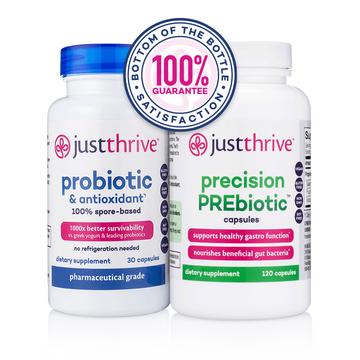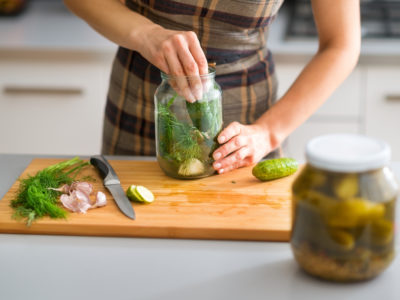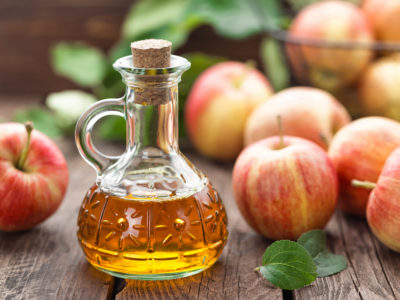Table of Contents[Hide][Show]
Bacteria is with you every day—and not just when you touch a dirty grocery store cart or someone nearby sneezes. Even right now, there are millions of bacteria living on your skin and in your gut. Sounds scary? It isn’t!
It’s perfectly natural and, more importantly, these microscopic organisms are crucial for your best health and well-being.
Surprising, but true: Not all bacteria are bad. In fact, there are trillions of beneficial bacteria, known as probiotics, that help keep your body functioning at its prime. And supporting your best digestive, immune, and even emotional health requires that you have plenty of these good guys on hand (and in your body) at all times.
Not sure about the best way to introduce healthy bacteria (probiotics) into your system? Read on to find out more about probiotic foods and supplements, as well as specifics regarding the best time to take probiotics. Plus, we’ll give you a “cheat sheet” of our favorite suggestions for adding probiotic-friendly foods into your daily diet.
What Are Probiotics?
There are both “good” bacteria (probiotics) and “bad” bacteria (pathogens) that occur naturally in your body. Two of the most well-known strains of probiotics are Lactobacillus and Bifidobacterium. They live on your skin and in your mouth, nose, and gut.
Your gut (aka digestive tract or gastrointestinal tract) is of particular importance because this is where most of your immune system lives. Both bacterial types can establish flourishing gut communities, which means your ratio of good bacteria vs bad bacteria dictates how good or bad you feel. The setting for this often precarious power struggle is known as your gut microbiome. In an optimally healthy gut, your good, or beneficial, bacteria will always outnumber the harmful bacteria in quantity and quality.
When the colonies of beneficial bacteria are thriving, you’ll maintain strong gut health, boost your immune system, and promote your overall health and well-being.
Why You Need Probiotics
If we lived in a “perfect” world the way Mother Nature designed it…
The soil would be microbially rich with critically important, gut-health promoting beneficial bacteria. Plants would grow organically, free of chemicals and toxins, and be naturally covered with health-promoting strains.
Every bite of food, starting with that very first mouthful when a baby transitions off the breast, would reintroduce these bacteria back into the gut to once again start their important, gut-cleansing-and-balancing journey down the intestinal tube.
After digestion and evacuation, they would be excreted and RETURNED TO THE SOIL to start the process all over again. The beneficial microbes in our bodies would live in harmony with nature, each fueling the other.
But life today is far from perfect… Instead, in the westernized, industrial world, we have interrupted that natural cycle in virtually every way possible, starting with pressing down the toilet handle.
Since the late 40’s and the advent of conventional farming, we have been systematically sterilizing beneficial bacteria out of:
- The soil
- All our agricultural growing practices
- All our food processing systems
- Our environment in general
In our misguided attempts to remove “all” bacteria, we’re also eliminating the beneficial bacteria that our bodies need.
This is why we now must supplement either via diet or products… There’s no other way we can give our body the bacterial support it needs!
Adding probiotics on a daily basis will help elevate the quantity of good bacteria and keep your gut functioning optimally.
The Importance of Balance
Ideally, your gut always contains more probiotic bacteria and less pathogens.
But these days, it’s all too easy to disrupt the delicate balance of your gut microbiome, leading to an increase in bad bacteria:
- Bad bacteria enters your body through a cut, scrape, or your mucous membranes.
- Stress emboldens pathogens and can tip the scales in their favor.
- Antibiotics disrupt the balance of bacteria in your gut flora.
- Diets high in processed foods or sugar negatively affect beneficial bacteria.
Regardless of the cause, this imbalance can lead to illness, infection, digestive issues, and a slower metabolism. Adding probiotics can strengthen the colonies of beneficial bacteria and help restore the balance once again.
How Probiotics Impact Your Body
There are numerous health benefits of probiotics. Probiotic foods and supplements raise the levels of beneficial bacteria in your body. They also optimize the strength of your gut microbiome to boost your overall health and well-being.
Your Immune System
One surprising benefit of probiotics is that they support stronger immune function. Roughly 70-80% of your immune system is housed in your gut. A healthier gut, thanks to probiotics, leads to a stronger, more active immune response.
This can help you:
- Fight off illnesses and infections
- Reduce symptoms
- And recover more quickly
Other Benefits of Probiotics
Probiotics have also been shown to shine in other areas, especially when it comes to digestive health conditions. Research shows that they may be helpful in treating or preventing:
- Diarrhea
- Constipation
- Irritable Bowel Syndrome (IBS)
- Ulcerative Colitis
- Crohn’s Disease
- Vaginal Infections
- Yeast Infections
- And more
When Is the Best Time to Eat Probiotic Foods?
Adding probiotic-friendly foods to your daily diet will boost the numbers and strength of the beneficial bacteria living in your gut microbiome. But just as you (probably) don’t drink coffee at night, timing is everything. For the probiotics to achieve their maximum effectiveness, you have to take them at the right time.
Probiotic foods are most effective on an empty stomach.
For most people, this means that the best time of day to eat probiotic food is either early in the morning, right before a meal, or right before bed. Probiotics consumed after a meal have been shown to be less effective.
Your yogurt at breakfast or probiotic tea before bed isn’t just delicious. There’s also solid scientific evidence as to why it increases your beneficial bacteria levels more than, say, a kefir smoothie for dessert.
Related
9 Best Vegan Probiotics For Gut Health
If you do not consume dairy, here are some vegan probiotic foods that are are fantastic when it comes to taking care of your gut health.
Why You Should Eat Probiotic Food on an Empty Stomach
For the beneficial bacteria in probiotic foods to make it to your large intestine—the “gut” of your gut microbiome—it must first pass through your harsh stomach acids. Your stomach is designed to break down food, drink, and any other particles. Unfortunately, that includes probiotics.
When you eat, the production of gastric acid in your stomach is increased to aid the digestion process. But while this acid is crucial for digestion, it can be greatly detrimental to probiotic foods. In fact, when eaten at the wrong time, a whopping 60% of the beneficial bacteria could be killed by gastric acids!
You want to give the beneficial bacteria in your food the chance to make it through that hostile acidic environment relatively unscathed. That means consuming probiotic-friendly food when your stomach isn’t in digestion mode, to minimize the amount of gastric acid that might attack the probiotics.
How to Add Probiotic-Friendly Foods to Your Diet
Adding probiotic-rich foods to your diet is one easy way to increase the quantity of helpful gut bacteria. For the most part, this means food and drinks that have been fermented.
How Fermentation Creates Probiotics
For centuries, people have used fermentation to process food, transforming one type of food into another: cucumbers become pickles, milk becomes yogurt, soybeans become miso…
As it turns out, fermentation doesn’t just preserve food. It also optimizes the food’s health potential with beneficial bacteria.
During fermentation, naturally-occurring bacteria (found in the food itself and the surrounding air) feed on the sugar and starch in the food, creating acid as a byproduct. This generates an environment that supports the growth of enzymes, B vitamins, omega-3 fatty acids, and of course, beneficial bacteria. For example:
Lactic Acid Bacteria (LAB)
Fermentation is sometimes referred to as lacto-fermentation, because the most commonly produced acid is lactic acid. And as a result, the probiotic most often found in fermented foods is lactic acid bacteria or Lactobacillus—the same beneficial bacteria often advertised on probiotic yogurts, for example.
Acetic Acid Bacteria (AAB)
Fermentation will sometimes produce acetic acid instead, which is associated with the development of vinegars. Kombucha and apple cider vinegar both produce acetic acid as part of their fermentation process. The beneficial bacteria created as a result is Acetobacter, also known as acetic acid bacteria.
Related
Apple Cider Vinegar: Immune System Boost or Bust?
Learn more about apple cider vinegar immune system benefits and whether you should add it into your overall wellness plan.
Probiotic-Friendly Foods
Of course, not all fermented foods contain beneficial bacteria. In general, if a fermented food has been exposed to high temperatures, through processes such as canning or baking, then it probably does not contain probiotics. Other foods and drinks, such as beer, will have the live probiotics filtered out.
Luckily, there are still many foods and beverages that are probiotic-friendly for you to choose from:
- Buttermilk
- Cheeses (only some, check your labels!)
- Kefir
- Kimchi
- Kombucha
- Miso
- Pickles
- Sauerkraut
- Sour Cream
- Tempeh
- Yogurt
Fermentation changes a food’s scent and flavor quite a bit. In general, they are a bit stronger and may take some getting used to. Not everyone is going to be a fan of pickles from the first bite!
If you are not already eating fermented foods, you may prefer to introduce these unique flavors into your diet slowly, by adding them to some of the dishes you already enjoy regularly. For example, you can use kefir in your regular smoothie recipes, add pickles into your sandwiches or salads, or mix yogurt with your favorite fruits.
Yogurt is an especially popular way to add probiotics to your diet. Most yogurts come in a variety of flavors, so you’ll most likely be able to find one that appeals to you. But not all yogurts are created equal;check the labels to make sure you’re buying one with “live and active” probiotic cultures. You should also try to choose brands that contain little to no sugar (i.e. plain yogurt) when possible, as these are best for your overall health. Excessive sugar consumption can have a detrimental effect on the gut.
With the burgeoning popularity of probiotic-friendly foods, you should be able to find all of these at your local grocery store.
Probiotic-Friendly Food Plan
If you’re not sure how to add them to your diet, here are some simple, delicious suggestions:
First Thing in the Morning or with Breakfast
- Yogurt
- Kefir milk with cereal
- Smoothie made with kefir milk
With Lunch
- Cottage cheese
- Pickles (or other pickled vegetables) added to a salad or sandwich
- Miso soup
With Dinner
- Tempeh
- Sauerkraut
- Kombucha
At Bedtime
- Probiotic lavender tea
Experiment with different options and look online for some new recipes. You’ll be sure to find tasty ways to add probiotics into your diet!
When Is the Best Time to Take Probiotics in a Supplement?
Probiotic supplements are the easiest and most effective way of boosting your beneficial bacteria and optimizing your gut health.
And just like with probiotic-boosting foods, the timing of when you take probiotic supplements is crucial in maximizing their efficacy and positive benefits.
High-quality probiotic supplements give optimal results with your biggest meal.
If you follow a more American dietary structure, that means you’ll probably be taking a probiotic capsule with dinner. But if you eat your biggest meal at midday, like many Mediterranean or Caribbean countries, then you should take your probiotics at lunchtime.
Why You Should Take Probiotics with Your Biggest Meal
To answer that question thoroughly, first let’s discuss the importance of choosing the right probiotic supplement.
Probiotic supplements are formulated to deliver high quantities of beneficial bacteria (in the trillions!) to your gut while working with your body’s normal functions, including the gastric acids in the digestive system.
In that sense, probiotic supplements can be a life jacket for your beneficial bacteria.
Like any nutritional supplement, probiotics from different sources can vary greatly in effectiveness. Survivability studies with some of the leading probiotics (as high as 250 billion CFUs) indicate that 99% of the strains cannot survive digestion. This shocking finding suggests that most people are paying for products with less than 1% survivability. When it comes to optimizing your levels of beneficial bacteria, it’s crucial to choose the highest quality option: spore-based probiotics.
Spore-based probiotics are created using microorganisms commonly found in soil and vegetation. This specific type of beneficial bacteria has a much higher survivability rate in harsh environments, such as the gastric acids in your stomach, than the probiotics formed in food or sub-par probiotics.
In contrast to other strains of beneficial bacteria, spore-based probiotics thrive during the digestive process, naturally protecting themselves from your stomach acids, and using the food you eat as fuel (i.e. prebiotics) to better colonize your gut microbiome.
Recondition Your Gut & Build New, Healthy Flora
Meet your probiotic and prebiotic needs with Just Thrive® Core Health (Probiotic + Precision PREbiotic).

How to Choose the Right Probiotic Supplement
With so many options on the shelves, choosing the right probiotic supplement can seem overwhelming. Here are the top three things you should consider when shopping for the best solution for your gut microbiome.
Confirm Clinical Survivability Tests
Carefully read labels and websites to make sure any probiotic supplements you purchase have passed clinical tests. This ensures that the beneficial bacteria will survive it’s trek through gastric acids and into your gut microbiome.
Verify DNA
Supplement companies aren’t required to list their ingredients on the label. This can lead to poor quality, useless fillers… or worse.
Always choose products that are “DNA Verified.” This guarantees that your supplements contain the strains and potency listed on the label.
Only Buy Spore-Based Probiotics
Probiotics only work at maximum effectiveness if they make it to your gut alive!
Spore-based probiotic strains are naturally tougher and have a higher survival rate in harsher environments.
Look for spore-based bacterial strains such as:
- Bacillus subtilis
- Bacillus indicus
- Bacillus coagulans
- Bacillus clausii
The Bottom Line
Because of their incredibly beneficial results to your overall health and vitality, probiotics should form part of your daily diet. But to maximize the benefits of these microorganisms, you have to take them at the right time, and the right time depends on whether you are eating probiotics-friendly foods or taking probiotic supplements.
For probiotic-friendly foods, this means consuming them on an empty stomach, and for probiotic supplements, you’ll be taking them with your largest meal of the day.
You should consult your healthcare provider before taking probiotic supplements or to determine if you have any food-based allergies. Probiotics can have mild side effects such as bloating and gas, but these often improve over time. Discuss any interactions of probiotics with prescribed medications with your doctor as probiotics may increase drug effectiveness.
Taking probiotics properly will optimize their benefits and support your most optimal wellness.
You May Also Like…






